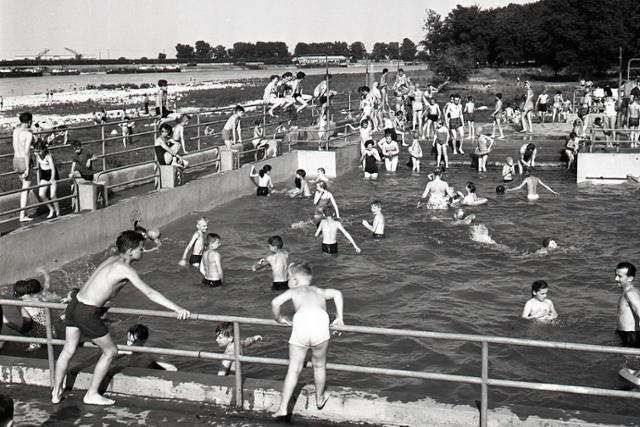Confrontations / POOL_CITY
The individual texts of the series consist of a juxtaposition of words - City, Myth, Modernity, Pool. The mutual confrontation of pairs of words is not about confirming unambiguous relations, a harmonious whole, but about searching for possible disagreements. The confrontation narrows the wide range of their individual meanings.

Bratislava lido, source: bratislavskenoviny.sk
“With the independence of the state and the establishment of Bratislava as the capital of the Slovak Republic, the city has been given such an important position as it has never had in its history. This important position is not only a new historical phase of development, but also an obligation for the city administration to rebuild the city in such a way that its overall image, and especially its technical construction, will suitably and worthily represent the political independence and the economic, technical, cultural and social maturity of the Slovak nation, with the effective cooperation of all the forces called upon to do so.”[1]
After the establishment of the modern Slovak Republic, the main emphasis was placed on the technical construction of the city, which found itself in a completely new situation with tasks that had not been solved before. The basic changes concerned transport, the street network, housing, administrative offices, schools, institutes, sports grounds and swimming pools. It was necessary to address the health and technical condition of the city, also because of the expected increase in population.[2] In this area, in addition to a substantial extension of the city’s sewerage network, a more systematic construction of the city’s public bathing facilities was on the agenda.
Apart from the general topicality and popularity of the construction of sports and recreational typologies in cities and the institutionalization of healthy lifestyles, and the corresponding leisure activities, another incentive was also essential in our conditions. The situation of the city after the Vienna Arbitration in 1938. Until the arbitration, there were few opportunities for swimming in Bratislava and its surroundings.
Swimming was largely tied to the Danube, even though it has relatively cold water. In 1847, 40 townspeople founded the Town Swimming Baths, which were originally exclusive. At the beginning of the 20th century, in 1904, the town built another, larger, swimming pool. These Danube swimming pools were gradually transferred from the Petržalka side to the city side, e.g. at Devín Castle. Sooner or later these swimming pools disappeared. There was also the Grossling Spa, which opened in 1895, first as a Water-treatment and spa institute and later as a bathhouse.[3]
The Lido, on the right bank of the Danube, was the first public swimming pool, founded in 1928. At first it was just a landscaped gravel bank with a wooden pool with river water, later more concrete pools were added. In addition, Bratislava residents could swim in Devín Lake, Senec,…But after the arbitration, the separation of Devín and Petržalka and their annexation to Germany, the city lost these valuable places and only wooden swimming pools on the Danube and the swimming pool at Železná studnička remained available.
The first other completed swimming pool was at Tehelné Pole in the early 1940s. From the statistics of its visits during the first season, the city management concluded that it would be necessary to complete other swimming pools. These would be in line with the ideals laid down by the Athens Charter for housing and recreation, and would be as accessible as possible and as quickly as possible to the inhabitants of the various districts of the city. Second only to the brick field, the bathing place was planned in the quarry under the Castle Hill, the design and preparatory work for which took place in 1941.[4]